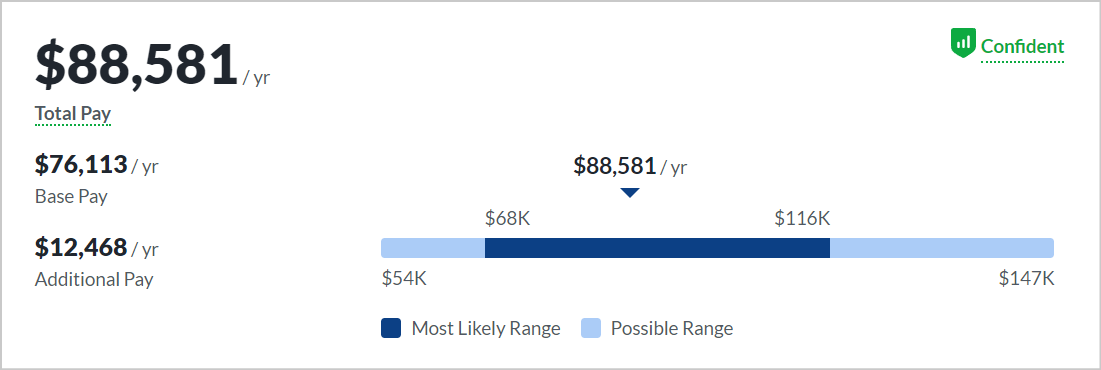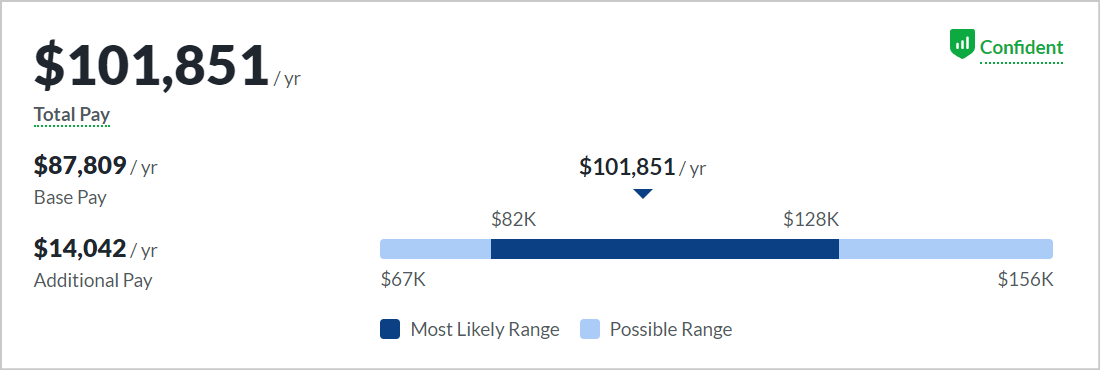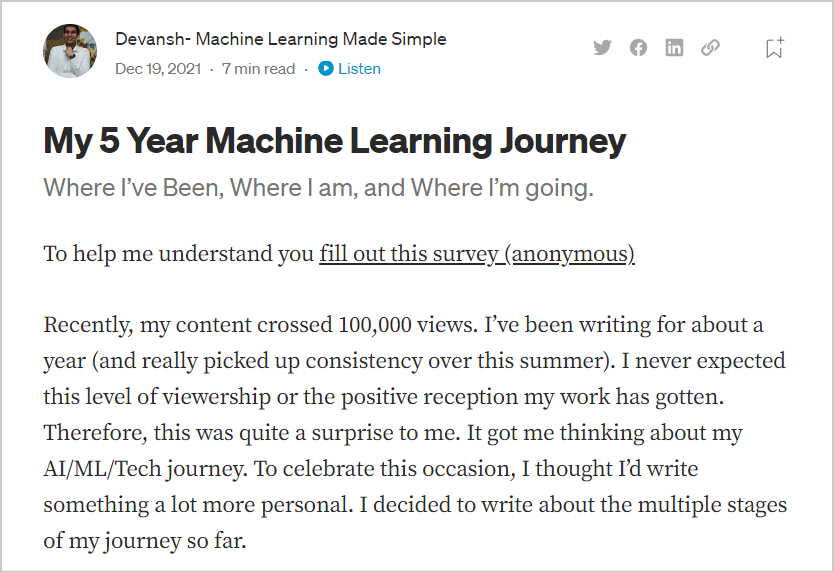Machine learning is among the most exciting fields in the software industry today. In fact, Indeed dubbed the role of machine learning engineer as the best job available on the US job market. Job openings for machine learning engineers grew by 340% between 2015 and 2018, showing that there’s plenty of demand to match the influx of talent in this space.
If you aspire to a job in machine learning, you’ve got plenty of options in front of you. So many options, in fact, that it can be hard to figure out which job is the right one for you.
If that’s where you’re at, then we’ve got you covered. Below, we’ll take a look at the most popular entry-level machine learning roles and cover the job skills associated with each of them. That way you have a better understanding of what you’re signing up for and can chart out your path toward the machine learning career that’s best suited for you.
Is It Easy To Land an Entry-Level Machine Learning Job?
Not if you have the right skill and education. Because of the breadth of skills required to work in this space, the barrier to entry can be high. So to land a job, you need to focus on enhancing your technical prowess while also working on projects that you can put on your portfolio.
7 Entry-Level Machine Learning Jobs

Let’s now take a look at some of the most common entry-level machine learning engineer job types out there. We’ll find out what machine learning skills each of these roles require, job responsibilities, and the annual salary on offer.
Machine Learning Intern
Machine learning intern is something of a broad job title that will give you hands-on experience with a wide range of skills in this field. Depending on the requirements of your company, you may be tasked with developing new machine learning algorithms, analyzing datasets, or building and testing machine learning models.
That might seem like a lot of different job responsibilities rolled into one but that’s what a machine learning internship is all about. It’s an opportunity to find out how all these different advanced technologies are deployed in the real world and determine which machine learning position you want to pursue as a career.
How Much Can You Make
The average salary for machine learning interns in the United States is $88,581.

Educational Qualifications, Skills, and Other Basic Requirements
Companies usually pick machine learning interns from applicants who are currently enrolled in a relevant college degree. That usually means a bachelor’s degree in computer science or mathematics. You might also be considered if you’ve just completed a machine learning bootcamp and want to gain some real-world skills.
You don’t need to possess advanced skills in any one area of machine learning to work as an intern. Rather, what’s required is a general skill set that you can apply to different business challenges. And most importantly, you should be able to learn new things on the job and pick up the rigors of a professional environment quickly.
Junior Machine Learning Engineer
The junior machine learning engineer role is a position in which you’ll get a taste of developing self-contained machine learning systems. You’ll work with data scientists, software engineers, and database architects to develop both supervised and unsupervised learning systems and create models with predictive capabilities.
Machine learning engineer roles also involve a lot of work with data. You’ll often be tasked with finding or putting together datasets on which your models can be trained. You might also use data visualization techniques to comprehend your own findings and present them to different stakeholders in your organization.
How Much Can You Make
The average base salary for junior machine learning engineers is $124,813.

Educational Qualifications, Skills, and Other Basic Requirements
Junior machine learning engineers usually land their job after earning a degree in computer science or mathematics. Companies also consider candidates who have completed machine learning bootcamps.
You need to have a strong foundational understanding of a few areas of mathematics to work as a machine learning engineer. That includes basic calculus, linear algebra, and statistics.
Given that this is an engineering role, you’ll also need to know how to work with programming languages—Python, C++, and Java are among the most commonly used. If you’re new to programming, then it’s recommended that you start with Python and work your way to other languages if your job demands it.
Junior Data Scientist
Data scientist is one of those job roles that’s really gained prominence in the tech industry over the past few years. That’s partly because of the demand for data professionals and the increased importance of data across industries.
As a junior data scientist, you will be asked to contribute to just about any task that involves data in your organization. That means that you’ll need to get good at building datasets, cleaning data, and building custom analytics applications.
How Much Can You Make
Junior data scientists make $88,237 annually on average.

Educational Qualifications, Skills, and Other Basic Requirements
You will generally be asked to have at least a bachelor’s degree in computer science or information technology to apply to junior data scientist roles. But it is increasingly becoming possible to land these jobs if you’re self-taught and have a strong portfolio of data science projects.
Big data is all the rage these days and you will have to get good at working with it. Working with large data volumes is a skill in itself and you will be tested in that ability in your work as a junior data scientist. Building predictive models, designing recommendation systems, and creating segmentation algorithms are some of the skills that will come in handy in that regard.
Software engineering skills are increasingly becoming a requirement for data scientists. You will boost your prospects by gaining an understanding of the software development lifecycle and having a working knowledge of a framework like agile software development.
Junior Data Engineer
Data engineers are professionals who concern themselves with engineering data handling systems. Their job begins with analyzing the requirements of a project and coming up with a suitable data architecture. They then set about implementing that architecture and fleshing out its different parts.
Junior data engineers are usually assigned to work on specific parts of that process. The big-picture stuff is usually left to senior data engineers. Junior professionals work on conducting research, implementing data collection systems, and analyzing data manipulation techniques.
How Much Can You Make
Junior data engineers have an average annual salary of $105,426.

Educational Qualifications, Skills, and Other Basic Requirements
A bachelor’s degree in computer science or a related field is usually a requirement for data engineering jobs. You can further boost your profile with a graduate degree in data science or mathematics.
SQL is a key skill for anyone who wants to work as a data engineer. It’s a technology that you will use often to work on relational database systems. So you’ll need to get good at writing queries in SQL and using it to manipulate the data in your databases.
Another key skill in this field of machine learning is data architecture. Data engineers need to have a strong understanding of data-dependent processes and develop systems that have project-specific characteristics. Apache Hadoop is a machine learning tool that you can use to streamline your work in that area.
Junior AI Engineer
AI engineering is an exciting job role in which you’ll be asked to develop the code and architecture for artificially intelligent systems. These are computational systems that mimic human intelligence in the way that they’re able to comprehend data and learn from it.
The specific area of AI that you work on will depend on the goals of your project. Natural language processing, image processing, and deep learning are some of the areas that you can find yourself working in.
How Much Can You Make
The average annual salary of a junior AI engineer in the USA is $79,173.

Educational Qualifications, Skills, and Other Basic Requirements
AI engineers come from educational backgrounds in computer science, mathematics, and physics. You will need to have at least a bachelor’s degree to be considered for most jobs in this area.
AI engineers have a strong understanding of data structures and algorithms. Developing algorithms is a core part of this job role. You’ll use techniques like logistic regression, random forests, and linear regression to create algorithms and build AI models.
Automation is another important skill to pick up as an AI engineer. You’ll need to get good at automating processes that deal with data collection and processing. Various frameworks are used to carry out this work, including TensorFlow, Theano, and PyTorch.
Junior Data Analyst
Data analysis is the process of uncovering patterns that are hidden deep within large datasets. The job of junior data analysts involves finding relevant datasets and analyzing them to produce valuable business insights.
Data analysis is a multi-step process that includes data collection, cleaning, analysis, and reporting. Junior data analysts are assigned to one or more of these steps in each project. You’ll find yourself working in a larger team and with other stakeholders such as project managers and data engineers.
How Much Can You Make
Junior data analysts have an average salary of $62,088.

Educational Qualifications, Skills, and Other Basic Requirements
Increasingly, data analysts are being hired from bootcamps and courses. There are also various online degrees that you can take with a focus on data analysis. If you do want to take a more conventional route, then a degree in computer science is the way to go.
The most basic skill you will need as a data analyst is, of course, data analysis. There are various techniques that are used to analyze data that you need to have a working understanding of.
Junior Business Intelligence Developer
Business intelligence (BI) is a field that’s emerged as a focus for organizations making data-driven decisions. Business intelligence developers pick specific business problems and work on ways to solve them using data.
Business intelligence developers focus on the data that are produced at an organizational level. They collate this data and use it as the raw material for the analysis process. A strong BI process can help organizations find new business opportunities, optimize costs, and improve employee productivity.
How Much Can You Make
The average salary of business intelligence developers is $101,851.

Educational Qualifications, Skills, and Other Basic Requirements
Business intelligence is a field where you need to have both technical chops and a thorough understanding of business processes. On the technology front, it’s imperative to have a strong understanding of data analysis, databases, and software engineering. SQL, Python, and Tableau are some of the technologies that you’ll use as part of your work.
There are various tools that are commonly used by professionals in the business intelligence sector. They provide assistance with tasks such as data mining, statistics analysis, and big data analytics. If you aspire to a job in this field, you should be proficient with tools such as Microsoft Power BI, Zoho Analytics, or SAP Business Intelligence.
Get To Know Other Data Science Students
Diana Xie
Machine Learning Engineer at IQVIA
Bryan Dickinson
Senior Marketing Analyst at REI
Jonah Winninghoff
Statistician at Rochester Institute Of Technology
Tips To Land Your First Machine Learning Job
Here are a few things that you can do to maximize your chances of landing a job in the machine learning industry.
Polish and Tailor Your Resume
When applying to machine learning roles, you have to do two important things. The first is to tailor your resume for the job that you’re applying to. You’ll definitely want to check out our guide to crafting a machine learning resume.
Have a Strong Portfolio
A portfolio is a proof that you can get the job done. Recruiters love to see a portfolio with a few items that are highly relevant to the vacancy. The best way to get started is by contributing to open source projects and then working your way up to your personal machine learning projects.
Your Network Is Your Net Worth
It’s essential that you build your network gradually as you work on your machine learning skills. Usually, it’s a lot easier to land a job through a referral as compared to the standard interview process. You can grow your network by connecting with machine learning professionals on LinkedIn and attending events for software professionals locally.
Know the Latest Trends
Machine learning is a field that’s at the cutting edge of the software industry. There’s always something new popping up that could change how you work as a machine learning professional. We’ve put together a list of resources that you can use to keep up with the latest goings-on in the industry.
Pursue an Internship
Going from an undergraduate course or machine learning bootcamp straight into a job can sometimes be a bit of a big leap. A good stop in between is a machine learning internship. That’s an opportunity to gain some real-world experience without the pressures of a full-time role. Read more about how you can land an AI internship here.
Getting Into Machine Learning: Real-Life Stories and Examples
Devansh – Machine Learning Made Simple

A lot of us want to breeze through our machine learning journey in a few months. But here’s someone who took five years to go from beginner to expert, which is a much more realistic timeframe. Devansh’s story shows us that picking up skills in this area is a long-term commitment and can be a rewarding process if you stick with it.
Patrick – AssemblyAI
Patrick is a machine learning developer advocate at AssemblyAI. In this video, he discusses how he would go about studying machine learning if he could start all over again. It’s a great watch because you get to watch a machine learning professional reflect on their journey and can learn how to do it better if you’re just starting out. The AssemblyAI YouTube channel is a great resource for technical machine learning content as well as career advice.
FAQs About Landing an Entry-Level Machine Learning Job
We’ve got the answers to your most frequently asked questions:
What Can I Expect From My First Machine Learning Job?
Your first machine learning job will usually be a role where you work on a specific part of a larger system in collaboration with more senior professionals. You will be exposed to a lot of new machine learning techniques and tools. It’s essential that you’re able to learn things quickly on the job and are able to pick up new skills quickly.
Can I Get a Machine Learning Job Without Any Experience?
The key to landing a machine learning job as a beginner is tailoring your resume and having a few portfolio projects under your belt. It goes without saying that you need to have the machine learning skills required for the role that you’re applying to.
Which Degree Is Best for Machine Learning?
A degree in computer science is a good base for a career in machine learning. It will give you exposure to a wide array of technical concepts and skills required for the job. Another route that you can consider is a degree in mathematics. Most of the work that you’ll do in ML will involve math and having a strong foundation in the subject is a huge advantage.
Companies are no longer just collecting data. They’re seeking to use it to outpace competitors, especially with the rise of AI and advanced analytics techniques. Between organizations and these techniques are the data scientists – the experts who crunch numbers and translate them into actionable strategies. The future, it seems, belongs to those who can decipher the story hidden within the data, making the role of data scientists more important than ever.
In this article, we’ll look at 13 careers in data science, analyzing the roles and responsibilities and how to land that specific job in the best way. Whether you’re more drawn out to the creative side or interested in the strategy planning part of data architecture, there’s a niche for you.
Is Data Science A Good Career?
Yes. Besides being a field that comes with competitive salaries, the demand for data scientists continues to increase as they have an enormous impact on their organizations. It’s an interdisciplinary field that keeps the work varied and interesting.
10 Data Science Careers To Consider
Whether you want to change careers or land your first job in the field, here are 13 of the most lucrative data science careers to consider.
Data Scientist
Data scientists represent the foundation of the data science department. At the core of their role is the ability to analyze and interpret complex digital data, such as usage statistics, sales figures, logistics, or market research – all depending on the field they operate in.
They combine their computer science, statistics, and mathematics expertise to process and model data, then interpret the outcomes to create actionable plans for companies.
General Requirements
A data scientist’s career starts with a solid mathematical foundation, whether it’s interpreting the results of an A/B test or optimizing a marketing campaign. Data scientists should have programming expertise (primarily in Python and R) and strong data manipulation skills.
Although a university degree is not always required beyond their on-the-job experience, data scientists need a bunch of data science courses and certifications that demonstrate their expertise and willingness to learn.
Average Salary
The average salary of a data scientist in the US is $156,363 per year.
Data Analyst
A data analyst explores the nitty-gritty of data to uncover patterns, trends, and insights that are not always immediately apparent. They collect, process, and perform statistical analysis on large datasets and translate numbers and data to inform business decisions.
A typical day in their life can involve using tools like Excel or SQL and more advanced reporting tools like Power BI or Tableau to create dashboards and reports or visualize data for stakeholders. With that in mind, they have a unique skill set that allows them to act as a bridge between an organization’s technical and business sides.
General Requirements
To become a data analyst, you should have basic programming skills and proficiency in several data analysis tools. A lot of data analysts turn to specialized courses or data science bootcamps to acquire these skills.
For example, Coursera offers courses like Google’s Data Analytics Professional Certificate or IBM’s Data Analyst Professional Certificate, which are well-regarded in the industry. A bachelor’s degree in fields like computer science, statistics, or economics is standard, but many data analysts also come from diverse backgrounds like business, finance, or even social sciences.
Average Salary
The average base salary of a data analyst is $76,892 per year.
Business Analyst
Business analysts often have an essential role in an organization, driving change and improvement. That’s because their main role is to understand business challenges and needs and translate them into solutions through data analysis, process improvement, or resource allocation.
A typical day as a business analyst involves conducting market analysis, assessing business processes, or developing strategies to address areas of improvement. They use a variety of tools and methodologies, like SWOT analysis, to evaluate business models and their integration with technology.
General Requirements
Business analysts often have related degrees, such as BAs in Business Administration, Computer Science, or IT. Some roles might require or favor a master’s degree, especially in more complex industries or corporate environments.
Employers also value a business analyst’s knowledge of project management principles like Agile or Scrum and the ability to think critically and make well-informed decisions.
Average Salary
A business analyst can earn an average of $84,435 per year.
Database Administrator
The role of a database administrator is multifaceted. Their responsibilities include managing an organization’s database servers and application tools.
A DBA manages, backs up, and secures the data, making sure the database is available to all the necessary users and is performing correctly. They are also responsible for setting up user accounts and regulating access to the database. DBAs need to stay updated with the latest trends in database management and seek ways to improve database performance and capacity. As such, they collaborate closely with IT and database programmers.
General Requirements
Becoming a database administrator typically requires a solid educational foundation, such as a BA degree in data science-related fields. Nonetheless, it’s not all about the degree because real-world skills matter a lot. Aspiring database administrators should learn database languages, with SQL being the key player. They should also get their hands dirty with popular database systems like Oracle and Microsoft SQL Server.
Average Salary
Database administrators earn an average salary of $77,391 annually.
Data Engineer
Successful data engineers construct and maintain the infrastructure that allows the data to flow seamlessly. Besides understanding data ecosystems on the day-to-day, they build and oversee the pipelines that gather data from various sources so as to make data more accessible for those who need to analyze it (e.g., data analysts).
General Requirements
Data engineering is a role that demands not just technical expertise in tools like SQL, Python, and Hadoop but also a creative problem-solving approach to tackle the complex challenges of managing massive amounts of data efficiently.
Usually, employers look for credentials like university degrees or advanced data science courses and bootcamps.
Average Salary
Data engineers earn a whooping average salary of $125,180 per year.
Database Architect
A database architect’s main responsibility involves designing the entire blueprint of a data management system, much like an architect who sketches the plan for a building. They lay down the groundwork for an efficient and scalable data infrastructure.
Their day-to-day work is a fascinating mix of big-picture thinking and intricate detail management. They decide how to store, consume, integrate, and manage data by different business systems.
General Requirements
If you’re aiming to excel as a database architect but don’t necessarily want to pursue a degree, you could start honing your technical skills. Become proficient in database systems like MySQL or Oracle, and learn data modeling tools like ERwin. Don’t forget programming languages – SQL, Python, or Java.
If you want to take it one step further, pursue a credential like the Certified Data Management Professional (CDMP) or the Data Science Bootcamp by Springboard.
Average Salary
Data architecture is a very lucrative career. A database architect can earn an average of $165,383 per year.
Machine Learning Engineer
A machine learning engineer experiments with various machine learning models and algorithms, fine-tuning them for specific tasks like image recognition, natural language processing, or predictive analytics. Machine learning engineers also collaborate closely with data scientists and analysts to understand the requirements and limitations of data and translate these insights into solutions.
General Requirements
As a rule of thumb, machine learning engineers must be proficient in programming languages like Python or Java, and be familiar with machine learning frameworks like TensorFlow or PyTorch. To successfully pursue this career, you can either choose to undergo a degree or enroll in courses and follow a self-study approach.
Average Salary
Depending heavily on the company’s size, machine learning engineers can earn between $125K and $187K per year, one of the highest-paying AI careers.
Quantitative Analyst
Qualitative analysts are essential for financial institutions, where they apply mathematical and statistical methods to analyze financial markets and assess risks. They are the brains behind complex models that predict market trends, evaluate investment strategies, and assist in making informed financial decisions.
They often deal with derivatives pricing, algorithmic trading, and risk management strategies, requiring a deep understanding of both finance and mathematics.
General Requirements
This data science role demands strong analytical skills, proficiency in mathematics and statistics, and a good grasp of financial theory. It always helps if you come from a finance-related background.
Average Salary
A quantitative analyst earns an average of $173,307 per year.
Data Mining Specialist
A data mining specialist uses their statistics and machine learning expertise to reveal patterns and insights that can solve problems. They swift through huge amounts of data, applying algorithms and data mining techniques to identify correlations and anomalies. In addition to these, data mining specialists are also essential for organizations to predict future trends and behaviors.
General Requirements
If you want to land a career in data mining, you should possess a degree or have a solid background in computer science, statistics, or a related field.
Average Salary
Data mining specialists earn $109,023 per year.
Data Visualisation Engineer
Data visualisation engineers specialize in transforming data into visually appealing graphical representations, much like a data storyteller. A big part of their day involves working with data analysts and business teams to understand the data’s context.
General Requirements
Data visualization engineers need a strong foundation in data analysis and be proficient in programming languages often used in data visualization, such as JavaScript, Python, or R. A valuable addition to their already-existing experience is a bit of expertise in design principles to allow them to create visualizations.
Average Salary
The average annual pay of a data visualization engineer is $103,031.
Resources To Find Data Science Jobs
The key to finding a good data science job is knowing where to look without procrastinating. To make sure you leverage the right platforms, read on.
Job Boards
When hunting for data science jobs, both niche job boards and general ones can be treasure troves of opportunity.
Niche boards are created specifically for data science and related fields, offering listings that cut through the noise of broader job markets. Meanwhile, general job boards can have hidden gems and opportunities.
Online Communities
Spend time on platforms like Slack, Discord, GitHub, or IndieHackers, as they are a space to share knowledge, collaborate on projects, and find job openings posted by community members.
Network And LinkedIn
Don’t forget about socials like LinkedIn or Twitter. The LinkedIn Jobs section, in particular, is a useful resource, offering a wide range of opportunities and the ability to directly reach out to hiring managers or apply for positions. Just make sure not to apply through the “Easy Apply” options, as you’ll be competing with thousands of applicants who bring nothing unique to the table.
FAQs about Data Science Careers
We answer your most frequently asked questions.
Do I Need A Degree For Data Science?
A degree is not a set-in-stone requirement to become a data scientist. It’s true many data scientists hold a BA’s or MA’s degree, but these just provide foundational knowledge. It’s up to you to pursue further education through courses or bootcamps or work on projects that enhance your expertise. What matters most is your ability to demonstrate proficiency in data science concepts and tools.
Does Data Science Need Coding?
Yes. Coding is essential for data manipulation and analysis, especially knowledge of programming languages like Python and R.
Is Data Science A Lot Of Math?
It depends on the career you want to pursue. Data science involves quite a lot of math, particularly in areas like statistics, probability, and linear algebra.
What Skills Do You Need To Land an Entry-Level Data Science Position?
To land an entry-level job in data science, you should be proficient in several areas. As mentioned above, knowledge of programming languages is essential, and you should also have a good understanding of statistical analysis and machine learning. Soft skills are equally valuable, so make sure you’re acing problem-solving, critical thinking, and effective communication.
Since you’re here…Are you interested in this career track? Investigate with our free guide to what a data professional actually does. When you’re ready to build a CV that will make hiring managers melt, join our Data Science Bootcamp which will help you land a job or your tuition back!







